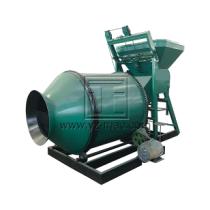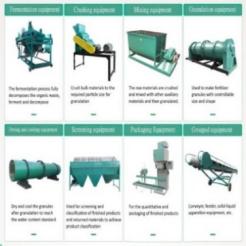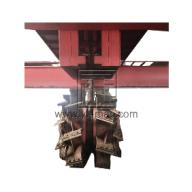Compost mixing machine
A compost mixing machine is a specialized piece of equipment designed to blend and mix organic waste materials during the composting process. It plays a crucial role in achieving a homogeneous mixture and facilitating the decomposition of organic matter. Compost mixing machines come in various types, each offering unique features and benefits.
Tumbling Composters:
Tumbling composters are designed with a rotating drum or barrel that can be manually or mechanically turned. They provide efficient mixing by allowing the user to tumble or rotate the composting materials, ensuring thorough blending. Tumbling composters are suitable for small-scale or backyard composting, providing a convenient and effective way to mix organic waste materials.
Paddle Mixers:
Paddle mixers utilize rotating paddles or blades to thoroughly mix the composting materials. They are commonly used in larger-scale composting operations, such as municipal composting facilities or commercial composting sites. Paddle mixers ensure uniform blending of organic waste, amendments, and bulking agents, promoting optimal decomposition.
Auger Mixers:
Auger mixers incorporate a rotating screw-like mechanism, known as an auger, to mix the composting materials. These mixers are particularly effective in handling high-moisture or sticky materials. Auger mixers are commonly used in industrial-scale composting operations, where efficient blending and handling of large volumes of organic waste are required.
Windrow Turners:
Windrow turners are specialized machines used in large-scale composting facilities to mix and aerate the compost windrows. These machines straddle the compost pile and use rotating drums or flails to lift and turn the materials. Windrow turners ensure thorough mixing and aeration of the compost, promoting decomposition and preventing the formation of anaerobic conditions.
Mobile Mixing Units:
Mobile mixing units are versatile machines that can be transported to different composting sites. They are equipped with mixing mechanisms, such as paddles or augers, and can be easily attached to tractors or other vehicles. Mobile mixing units provide flexibility for on-site mixing and blending of organic waste materials.
Applications:
Compost mixing machines have various applications across different sectors, including:
Agriculture and Horticulture:
Compost mixing machines are widely used in agriculture and horticulture for the production of high-quality compost. Blending organic waste materials with bulking agents, such as straw or wood chips, enhances the nutrient content and structure of the compost. This nutrient-rich compost can be used to enrich soil, improve plant growth, and promote sustainable agricultural practices.
Landscaping and Gardening:
Compost mixing machines are valuable tools for landscapers and gardeners. They enable the production of customized compost blends by combining different organic waste materials, amendments, and soil additives. These compost blends can be used to improve soil fertility, enhance moisture retention, and promote healthy plant growth in gardens, parks, and landscaping projects.
Waste Management:
Compost mixing machines play a crucial role in large-scale waste management systems, such as municipal composting facilities. They facilitate the efficient blending and decomposition of organic waste, diverting it from landfills and reducing greenhouse gas emissions. By converting organic waste into nutrient-rich compost, these machines contribute to sustainable waste management practices.
Conclusion:
Compost mixing machines are essential tools for achieving efficient composting and producing high-quality compost. With a wide range of types and applications, these machines offer flexibility and versatility for various composting needs. Whether for small-scale home composting or large-scale commercial operations, compost mixing machines play a vital role in creating nutrient-rich compost for agriculture, landscaping, and sustainable waste management practices.






